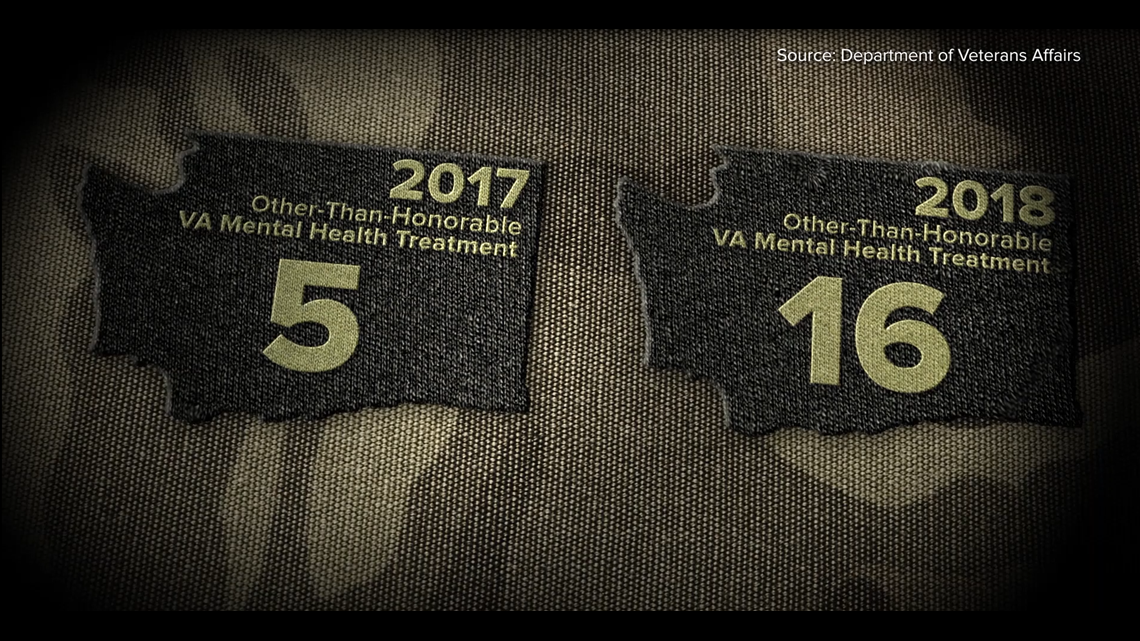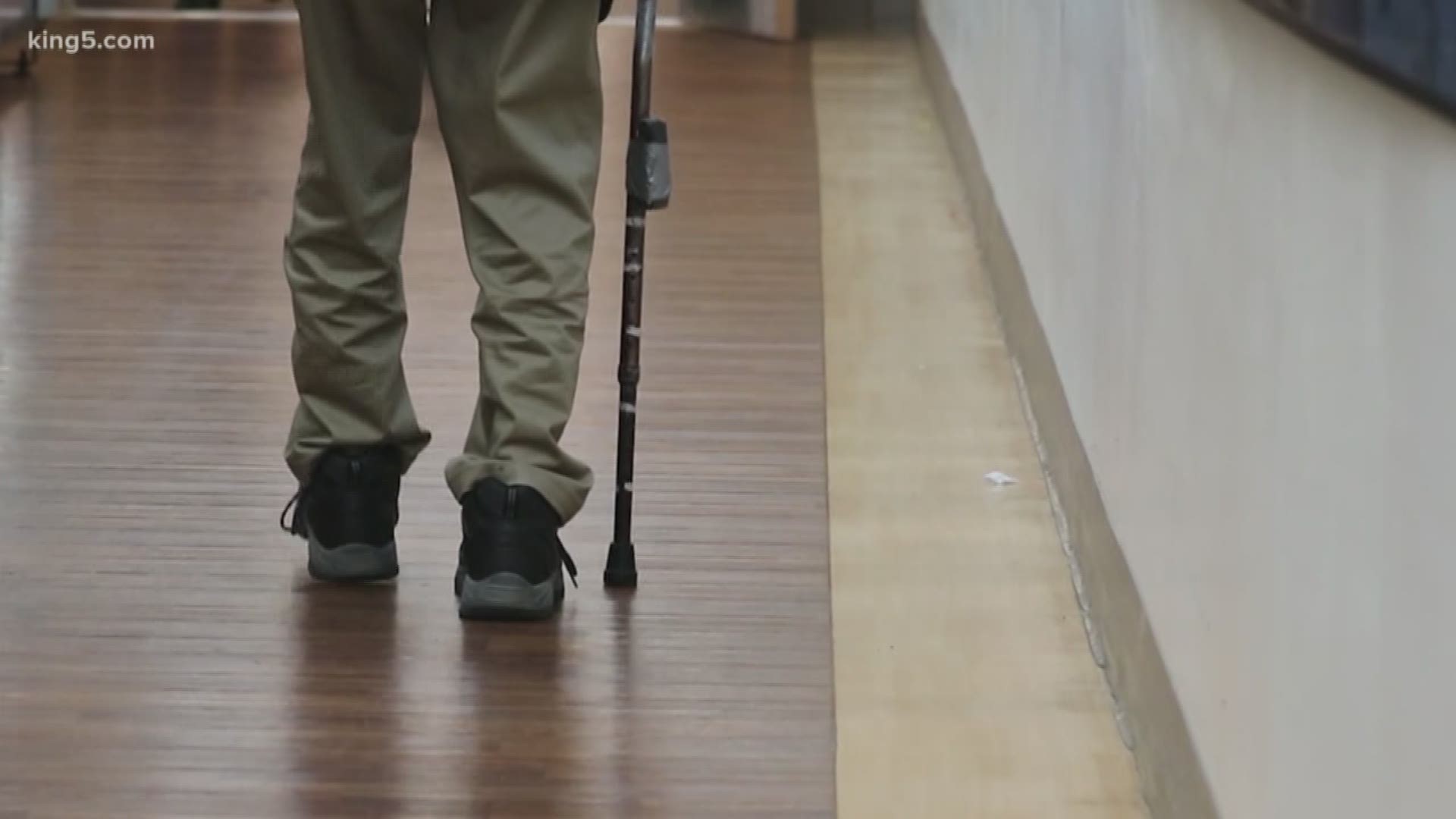SEATTLE — Several current and former members of Congress who championed a 2018 law that makes a vulnerable group of veterans eligible for mental health care at the U.S. Department of Veterans Affairs are calling for change after a KING 5 story revealed the VA mishandled the program's roll out.
Sen. Patty Murray (D-WA), a senior member of the U.S. Senate Committee on Veterans' Affairs, said Tuesday that she's concerned about the VA's failure to reach other-than-honorable veterans who qualify for mental health treatment under the law, which Congress passed in March 2018 to reduce suicides among the group of veterans who previously were largely ineligible for care.
"Obviously I am not happy with how the VA has implemented the law," said Murray, who co-sponsored the legislation. "It is their responsibility. It is our responsibility for oversight, which we are following this very closely on."
Nationwide, less than one percent of veterans with other-than-honorable discharges received mental health treatment at the VA last year, according to data provided by a VA spokeswoman.
Congress set a 180-day deadline for the VA to notify eligible veterans about the change, but it took the agency nearly a year after the law passed to make direct contact with veterans who qualified for care.


Murray said the 477,404 letters VA officials mailed to eligible veterans in January 2019 isn't sufficient, and the agency needs to do more to train personnel on the change.
"I'm happy they finally mailed the letters, but even that doesn't get to some of the most hard-to-reach veterans who do not have mailing addresses or an e-mail address or a phone who should be getting these services," she said. "If a veteran him or herself calls the VA and the person who answers doesn't have a clue what they are talking about, (the law) isn't implemented correctly."
Sen. Chris Murphy (D-CT), who was the lead sponsor of the legislation in the Senate, wrote in a statement last week that the details KING 5 reported on May 14 are "very concerning."
"The VA needs to get its act together and provide the services veterans are entitled to under the law," Murphy wrote. "I've been pushing the VA to do more to spread the word about the mental health services available to veterans, and I'll keep up this congressional oversight until more veterans are connected with the care they deserve."
Beto O'Rourke, the former Texas congressman who sponsored the legislation in the House, blasted the VA on Twitter and Facebook last week in response to KING 5's reporting.
"New reporting shows the VA has done little to spread the word and ensure these veterans get this lifesaving care. It's unacceptable. We know what's wrong, we know how to fix it, and now we need the VA to act," O'Rourke wrote. "It's unconscionable for even one veteran to be left behind. We're going to serve every veteran who served every single one of us."
Angeline Riester, a spokeswoman for Rep. Jaime Herrera Beutler (R-WA), said the congresswoman plans to follow up with the VA and assess "what else can be done to strengthen training and outreach."
"The VA should be following the directive set by Congress; look no further than the number of veterans facing homeless and mental health crises across Washington as evidence," Riester wrote in an e-mail Tuesday. "Expanding access to mental health resources has the potential to make a profound impact on these individuals and our communities, but it doesn't work if they aren't connected to the services."
VA blog post follows KING 5 story
To date, local and national VA officials haven't responded to KING 5's repeated interview requests, and they have not answered specific questions, including whether the agency will make changes to reach more veterans who qualify for care.
On May 15 — the day after KING 5 reported the VA mishandled the roll out of the law and failed to do enough to reach veterans who qualify— the VA published a blog post on the agency's website titled "Other-than-honorable discharge? You're still eligible for VA mental health care."
The post announced that mental health care treatment is available to former service members with other-than-honorable discharges through "two new programs." It includes information about a 2017 VA policy change that increased access to mental health care for other-than-honorable veterans on a short term, emergency basis. It also includes information about who qualifies for care under the 2018 law, which expanded the 2017 policy.
"The blog post is a good Band-Aid to address the problem, but they are going to have to do a lot more," said Kristofer Goldsmith, associate director for policy and government affairs at the Vietnam Veterans of America. "This is something that requires the attention of the (VA) secretary."
Goldsmith isn't the only veterans advocate who's calling for more action from the VA than a blog post.
Rose Goldberg, a veterans legal expert who has represented veterans with less-than-honorable discharges for years, said the blog post misses the mark because the people who need care the most won't see it.
"It doesn't change the fact that homeless veterans and elderly veterans have limited access to the Internet, and they are not going to be reached by a blog," Goldberg said. "Separately from that, the blog doesn't change the fact that VA health care staff isn't sufficiently trained on the program."
Margaret Kuzma, who represents veterans with less-than-honorable discharges at the Connecticut Veterans Legal Center, also said she's not satisfied with the VA's response.
"Is a blog post or letter describing a change in policy enough to reach this population? If I were struggling with a mental health condition after deploying or being the victim of military sexual trauma, and the VA had rejected me because my service 'didn't count,' I imagine that I might be so frustrated I wouldn't open mail from the VA. I certainly wouldn't be reading its blog posts." she said.

